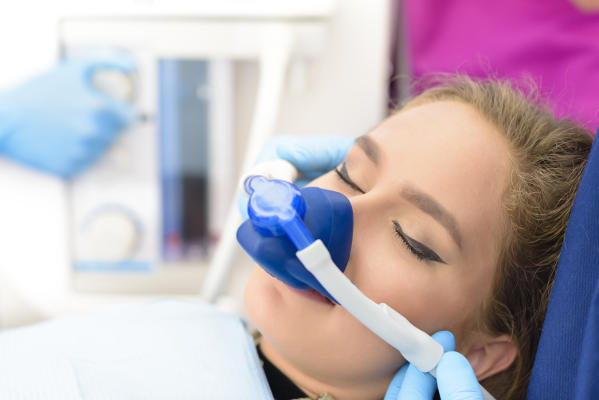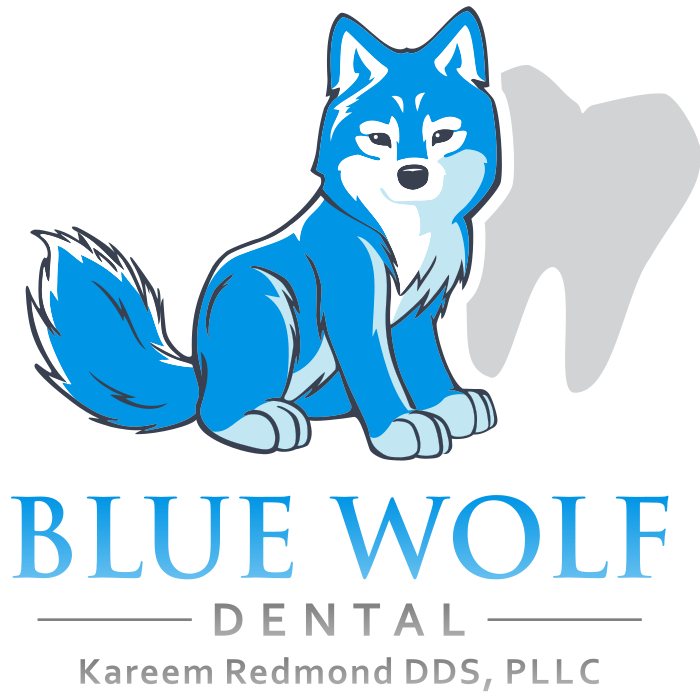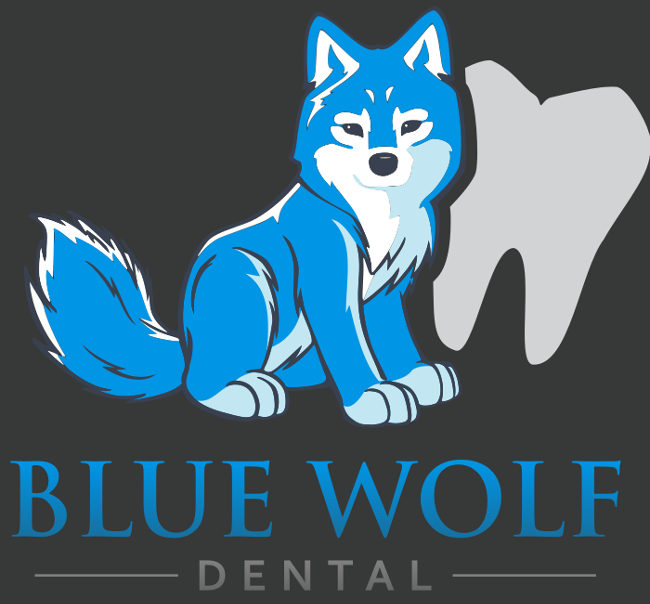Sedation Dentistry
Sedation dentistry helps take the anxiety out of getting dental work.
Here at Blue Wolf Dental we understand that having dental work can be a nerve racking experience. However, there is no need to worry if you find yourself feeling this way as it is a common feeling among most of the population. About 75% of the population has some form of anxiety about seeing the dentist. Of these people, 20% percent of them will only see the dentist if they are having extreme pain and 5% will avoid the dentist at all cost. As a way of making dental care an option for anxious patient, we have several sedation dentistry options available for our patients. These options include nitrous oxide (aka “laughing gas”), oral sedation, and even intravenous conscious sedation (aka “IV sedation”). With these sedation options we can make dentistry a relaxing experience for our most anxious patients or even patients that just want a long appointment to seem like it went by a lot faster.

Nitrous Oxide Sedation
Nitrous Oxide (also known as laughing gas) is a drug that has been used in dentistry safely for many years. Nitrous oxide is combined with oxygen to provide patients with a mild sedative effect in order to make dental treatment more comfortable. Patients often report a light tingling feeling as well as an altered sense of time from nitrous oxide. Listening to relaxing music can also enhance nitrous oxide sedation. Some patients love the feeling and feel very comfortable, while others require something more tranquilizing to get the comfort they need. In general, patients who have had traumatic dental or life experiences that have left a lasting memory are more comfortable with something that will relax them more than nitrous oxide alone.
Though nitrous oxide is a very safe medication, it is not indicated for all patients. Nitrous oxide is not indicated for patients that have emphysema, multiple sclerosis, chest problems, have a cold, conditions that cause difficulty breathing, or pregnant. You may want to ask your dentist for a “5 minute trial” to see how you feel with this type of sedation method before proceeding.
Oral Sedation
Oral sedation is another treatment option we have available for our patients in order to keep them comfortable and relaxed during dental treatment. Our most commonly used sedation medications are benzodiazepines, which are safe and effective. These medications are administered orally prior to treatment based on specific instructions given by the doctor. With oral sedation, our patients are awake and able to respond to questions. Patients often feel calm and unaware of the sights, smells and sounds of the dental office. Patients are often relaxed enough from oral sedation to actually fall asleep during the procedure. However, this effect does not happen with everyone as these medications effect different people in different ways.
Benzodiazepine drugs induce a calming effect, including drowsiness (“sedation”). In higher doses they induce a state resembling physiological sleep or “hypnosis”. Benzodiazepines are primarily used in dentistry to relieve anxiety and make you feel calm. While all benzodiazepines act as sedatives and anti-anxiety drugs, some are more targeted at brain areas which control sleep and wakefulness, while others are more specifically targeted at brain areas which control emotions, such as fear.
Benzodiazepines are Central Nervous System (CNS) and should not be mixed with other CNS depressants such as alcohol. The combination of these drugs can result in your breathing to dangerously low levels. This is why it is important to inform your dentist of all the drugs you are currently taking and to following the instructions for taking these sedative medications as prescribed. We require all patients that are undergoing oral sedation to have a driver bring them to and take them home from their dental appointment.
Moderate Conscious Sedation (IV Sedation)
What is moderate conscious sedation?
Moderate conscious sedation (IV sedation) is an altered state of consciousness where a patient becomes disassociated with their surroundings. Memory, anxiety levels, and perception of pain are greatly reduced with moderate conscious sedation. This allows dental treatment to be completed more comfortably for patients. Most patients having moderate sedation cannot remember most of the appointment due to the amnesia effect of the sedative drugs.
How is it different from general anesthesia?
When most patients think of sedation they think of being “completely out” as is often depicted on television. This level of sedation is called general anesthesia and it differs from moderate conscious sedation in many ways. With general anesthesia patients are unconscious with their reflexes diminished to the point a breathing tube must be placed in the airway to support breathing. Secondly, the drugs used for general anesthesia are very potent with the potential for undesirable side effects during and after the procedure. This adds up to more risk, expense, and considerably more specialized personnel to monitor you during and after the procedure.
Who is moderate conscious sedation for?
Moderate conscious sedation is a great treatment adjunct for patient’s that are reasonably healthy. For patients with a complex medical history, we will coordinate with patient’s physician to determine if they are healthy enough to undergo sedation. Patients can have IV sedation for any dental procedure, whether it is having their teeth cleaned or major oral surgery.
How will I feel?
With IV sedation you are awake, but their perception of what is happening during the appointment is diminished. Most patients do not remember or feel any part of the procedure, including numbing the teeth. The effects of the sedatives may last for several hours after the procedure and can result in a feeling of grogginess the rest of the day of your appointment.
How is it done?
The sedatives are usually administered intravenously. This allows the dentist to achieve the right level of sedation needed for the procedure. Sometimes, oral pre-medication is given to help relax patients before their appointment. Patients are required to have someone accompany them to their appointment to take them home, because they may feel groggy and disoriented after the procedure. We will not sedate patients if they do not have a responsible adult available to accompany them after their appointment.
Is it safe?
Moderate conscious sedation is very safe when done by well-trained providers, like those at Blue Wolf Dental. It is very important that you let us know about all medications and/or drugs you are taking and any medical problems that you may have had so that the sedation procedure can be altered to reflect your special needs. There can be serious side effects if we are not informed of all your prescription medications, unprescribed drugs being used, and medical conditions. Failure to inform us of these issues will put you at risk and may result in an emergency situation. For some patients, a consultation with their physician is helpful to prevent unanticipated problems.
All forms of anesthesia carry a small degree of risk. The effects of the anesthetic or sedative medications may cause prolonged drowsiness, light-headedness, headache, visual disturbances, amnesia and nausea. Nausea and vomiting, although not common, are potential side effects. Bed rest, and sometimes medications, may be required for relief. Allergic reactions (previously unknown) to any of the medications used is also a risk.
Our doctors at Blue Wolf Dental are trained to administer moderate sedation and manage any potential risks associated with treatment.
Before Intravenous Sedation
– You may not have anything to eat or drink (including water) for eight (8) hours prior to the appointment.
– No smoking at least 12 hours before surgery. Ideally, cut down or stop smoking as soon as possible prior to the day of surgery.
– A responsible adult must accompany the patient to the office and remain in the office during the procedure.
– The patient’s escort must drive the patient home and be able to stay with the patient until the effects of the anesthesia drugs wear off.
– The patient should not drive a vehicle or operate any machinery for 24 hours following the anesthesia experience.
– Please wear loose fitting clothing with sleeves which can be rolled up past the elbow, and low-heeled shoes.
– Contact lenses, jewelry, and dentures must be removed at the time of surgery.
– Do not wear lipstick, excessive makeup, or nail polish on the day of surgery.
– If you have an illness such as a cold, sore throat, stomach or bowel upset, please notify the office.
– If you take routine oral medications, please check with staff at Blue Wolf Dental prior to the date of your treatment for special instructions.

